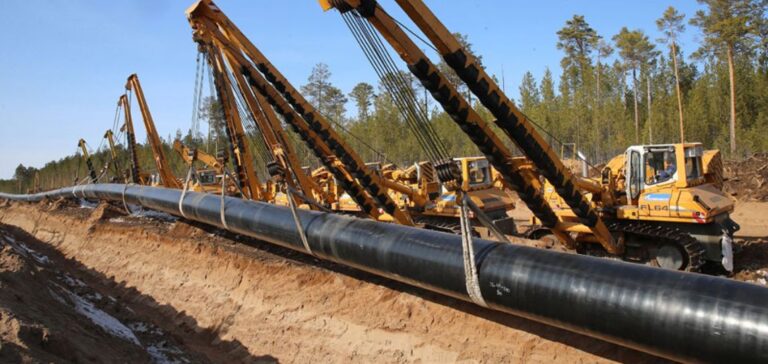The agreement Force Siberia 2, will thus complement, the gas pipeline Force Siberia1, active since 2019, extends 2,159 km between Siberia and China. The result of an agreement between Gazprom and CNPC in 2014, it delivers 38 billion cubic meters of Russian gas per year to China for 30 years.
The initial cost was 800 billion, revised to 1,100 billion rubles in 2018. The Power of Siberia project plans to connect the pipeline to the Kovykta field. Construction began in 2014 and was completed in 2019.
Siberian Force 2: An ambitious project to strengthen energy links
In 2023, at a meeting between the Russian and Chinese presidents, a new agreement was reached to build a second gas pipeline, called Siberian Force 2.
This Power of Siberia project aims to deliver 98 billion cubic meters of gas to China by 2030. The proposed pipeline would connect the Yamal Peninsula in western Siberia to China, the world’s largest growing consumer of energy and gas. The construction of the second pipeline, Siberian Force 2, will strengthen energy links between Russia and China. The ambitious project will run 2,600 km and have a capacity of 50 billion cubic meters of gas per year. It will cross eastern Mongolia and enter China from the north, according to Gazprom.
Feasibility study and objectives of China
Gazprom launched a feasibility study for the Power of Siberia project in 2020 and aims to start gas delivery by 2030.
China is not expected to need additional gas supplies until 2030. However, the country is seeking to diversify its energy sources and strengthen its energy security, particularly through Power of Siberia.
Political support and role of Mongolia
At the meeting between Presidents Putin and Xi, both sides expressed their support for the pipeline project and agreed to advance the study and approval work. Some details still need to be finalized before the Power of Siberia project can be officially launched. Mongolia, a third country involved in the project, has also expressed its support for the Force Siberia 2023 agreement, as well as for the construction of oil and gas pipelines linking Russia and China through its territory. Mongolian President Ukhnaagiin Khurelsukh said that the technical and economic justification of the Power of Siberia project should be studied before giving the green light to the construction.

Other energy projects in Asia
In addition to the Siberian Force 2 project, China is also planning to build a new pipeline, Central Asia-China Gas Pipeline D, to bring 25 billion cubic meters of gas per year for 30 years from Turkmenistan through Tajikistan and Kyrgyzstan. China also has long-term contracts with Qatar, the United States and other major global producers for the supply of liquefied natural gas (LNG).
Geopolitical and economic issues surrounding the Siberia Force 2 agreement
As relations between Russia and Europe deteriorate, Moscow is seeking to diversify its gas export markets and find new customers. The Siberian Force 2 project and 2023 agreement are seen as an opportunity for Russia to expand its presence in the Chinese market and reduce its dependence on European markets.
However, China will also have to weigh the pros and cons of becoming too dependent on Russian gas to avoid a situation similar to that of Europe.
Regional and global implications
Siberian Force and Siberian Force 2 are key projects in the global energy landscape, demonstrating the efforts of Russia and China to diversify their energy sources and strengthen their cooperation. These pipelines could potentially reshape gas flows in the region, with significant geopolitical and economic implications for the countries involved and the global energy markets.
After this Siberia 2023 power agreement, the expansion of gas infrastructure between Russia and China could also impact other energy projects in the region. For example, Russia may be more inclined to support gas pipeline projects in Central Asia, while China may be interested in energy infrastructure investments in Mongolia and Central Asia.
Overall, the Siberian Force and Siberian Force 2 projects symbolize a shift in global energy relations, with Russia and China strengthening their ties in the energy sector. As both countries continue their efforts to build and expand these pipelines, it will be important to monitor future developments and assess their potential impact on global energy markets and geopolitical relations.
In conclusion, the Siberian Force and Siberian Force 2 pipeline projects illustrate the ongoing cooperation between Russia and China in the energy sector. They could have a significant impact on global energy markets and geopolitical relations as Russia seeks to reduce its dependence on European markets and China seeks to diversify its energy sources. Monitoring future developments and assessing their potential effect on energy markets and international relations remains crucial.






















